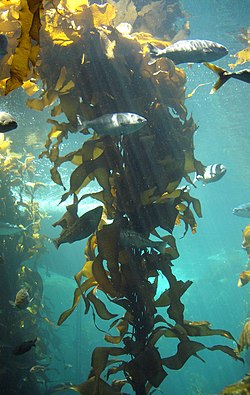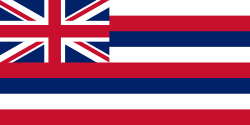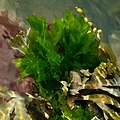or plants living near water, like algae. In Hawaii, there are approximately one hundred names for kinds of limu, sixty of which can be matched with...
22 KB (798 words) - 10:51, 15 February 2025
Limu Lake, Estonia; a lake Limu, Gongcheng County [zh], a town in Guangxi, China Limu (Haʻapai), islet in Tonga Limmu, an Assyrian eponym Limu (algae)...
965 bytes (171 words) - 01:30, 11 August 2024
Asparagopsis taxiformis (redirect from Limu kohu)
Asparagopsis taxiformis (red sea plume or limu kohu), formerly A. sanfordiana, is a species of red algae, with cosmopolitan distribution in tropical to...
13 KB (1,358 words) - 12:53, 24 May 2025
Red algae, or Rhodophyta (/roʊˈdɒfɪtə/, /ˌroʊdəˈfaɪtə/; from Ancient Greek ῥόδον (rhódon) 'rose' and φυτόν (phutón) 'plant'), make up one of the oldest...
63 KB (6,312 words) - 21:18, 22 May 2025
Brown algae (sg.: alga) are a large group of multicellular algae comprising the class Phaeophyceae. They include many seaweeds located in colder waters...
59 KB (5,875 words) - 10:05, 25 May 2025
Sargassum aquifolium (redirect from Limu Kala)
is an abundant brown algae of the order Fucales, class Phaeophyceae, genus Sargassum. In Hawaii, it is commonly known as limu kala. This alga is endemic...
6 KB (716 words) - 00:04, 18 February 2025
Gracilaria parvispora (category Algae of Hawaii)
removed as this is a sign of decomposition. Edible seaweed Gracilaria Limu (algae) List of marine aquarium plant species Mariculture Refugium (fishkeeping)...
15 KB (1,557 words) - 05:29, 19 March 2025
of not being around the bay. The coral reefs, fish, water growth, and limu (algae) growth was able to flourish without the heavy toll of tourism. There...
240 KB (23,051 words) - 04:26, 1 June 2025
The coastal underwater formations are home to one of the most striking limu (algae) found in the Islands.[citation needed] Martensia fragilis grows on rocks...
9 KB (975 words) - 16:06, 3 March 2025
Gracilaria coronopifolia, also known as limu manauea in Hawaiian, or ogo in Japanese, is a species of edible red algae (Rhodophyta) endemic to Hawai'i. Gracilaria...
3 KB (309 words) - 02:49, 10 January 2023
language as limu. She was credited with discovering over 200 species, with several named after her, including the Rhodomelaceae family (red algae) genus of...
22 KB (2,016 words) - 03:35, 25 May 2025
Dictyopteris australis (category Brown algae species)
known as "limu lipoa" locally, has a very pronounced cultural significance and is used in many ways from eating to traditional practices. Limu lipoa has...
5 KB (429 words) - 22:27, 13 February 2025
Seaweed (category Edible algae)
Species of seaweed Kombu – Edible kelp Limu Mozuku – Species of seaweed Nori – Edible seaweed species of the red algae genus Pyropia Ogonori – Genus of seaweeds...
33 KB (4,038 words) - 05:26, 2 June 2025
Edible seaweed (redirect from Culinary algae)
belong to one of several groups of multicellular algae: the red algae, green algae, and brown algae. Seaweeds are also harvested or cultivated for the...
30 KB (2,623 words) - 19:54, 31 May 2025
called wāwaeʻiole (meaning "ratʻs foot") and considered an edible alga or limu. Prominent ethnobotanist Isabella Abbott described its usage in her writing...
4 KB (522 words) - 19:53, 17 February 2025
environmentally destructive chemicals. In Hawaiian, Turbinaria ornata is called Limu Kahili. Limu, or seaweed, and Kāhili, which is a feathered ornament which was a...
7 KB (759 words) - 05:03, 13 August 2023
Ulva lactuca (category Algae of Australia)
salads. In Hawaiʻi, U. lactuca is also called limu pālahala and eaten in different ways: mixed with other algae, salted and served with raw fish, boiled in...
11 KB (1,162 words) - 18:19, 24 May 2025
reef flats growing on rocks or as epiphytes on other algae in shallow waters up to 7m depth. Limu is a regular part of the diet and is considered to contain...
4 KB (431 words) - 01:53, 24 May 2025
Porphyra (category Red algae genera)
that grow in cold, shallow seawater. More specifically, it belongs to red algae phylum of laver species (from which comes laverbread), comprising approximately...
17 KB (1,522 words) - 05:43, 12 January 2025
brown (class Phaeophyceae) macroalgae or limu (seaweed) in the order Fucales. Sargassum polyphyllum, or limu kala, consists of thin, rough, wavy blades...
3 KB (251 words) - 02:53, 14 August 2023
Palythoa toxica (redirect from Limu-make-o-Hana)
Palythoa toxica, also referred to by its Hawaiian common name, limu-make-o-Hana ('seaweed of death from Hana'), is a species of zoanthid native to Hawaii...
7 KB (806 words) - 08:35, 14 August 2024
live plants. Hobby aquarists use aquatic plants for aquascaping. Marine algae are also included in this list for convenience, despite the fact that many...
162 KB (3,369 words) - 19:21, 19 February 2025
durvillei, like other red algae, became a staple in the local cuisine and was incorporated into traditional dishes such as limu poke. It was also used in...
5 KB (566 words) - 20:40, 17 February 2025
Hawaiian: Limu 'Ele'ele, Hulu'ilio Japanese: 筋青海苔, suji-aonori Korean: 가시파래, romanized: gasiparae Swedish: Spretig tarmalg Gamtae-ji (green algae kimchi)...
10 KB (1,080 words) - 00:11, 24 May 2025
Gelidium (category Red algae genera)
Gelidium is a genus of thalloid red algae comprising 134 species. Its members are known by a number of common names. Specimens can reach around 2–40 cm...
25 KB (2,519 words) - 16:39, 22 May 2025
000 tons of bromomethane annually. Red algae, such as the edible Asparagopsis taxiformis, eaten in Hawaii as "limu kohu", concentrate organobromine and...
13 KB (1,557 words) - 01:29, 22 March 2024
Codium reediae (category Green algae species)
shallow water, in tidepools and reef flats. In Hawaiian Olelo, it is called Limu wāwae’iole, ‘a’ala, or ‘a’ala’ula meaning red fragrance. It shares these...
3 KB (245 words) - 20:04, 17 February 2025
that must be named according to the International Code of Nomenclature for algae, fungi, and plants). While some of the grapes in this list are hybrids,...
188 KB (919 words) - 07:07, 24 May 2025
of the demon. The moss growing in the cursed tide pool became known as "limu-make-o-Hana" which literally means "seaweed of death from Hana." The Hawaiians...
44 KB (4,541 words) - 18:57, 25 May 2025

























